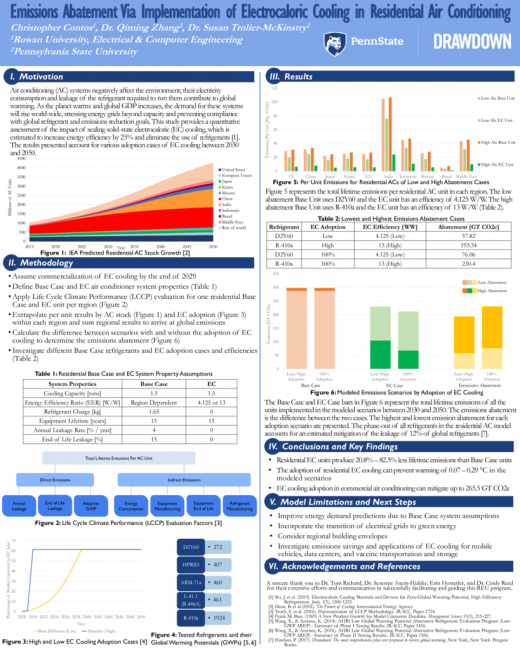Air conditioning systems negatively affect the environment; their electrical consumption and leakage of the refrigerant required to run them contribute to global warming. As the planet warms and global GDP increases, the demand for these systems will rise world-wide, stressing energy grids beyond capacity and preventing compliance with global refrigerant and emissions reduction goals. This study provides a quantitative assessment of the impact of scaling electrocaloric (EC) cooling which is estimated to increase energy efficiency by 25% and eliminate the use of refrigerants. The emissions abatement is modeled on a global scale between 2015 and 2050. Using a Life Cycle Climate Performance (LCCP) evaluation, the emissions of one residential or commercial air conditioning unit per region were modeled. The emissions from the individual units were then extrapolated with respect to the residential or commercial AC unit stock within each region to arrive at total regional emissions. The results from each region were then summed to arrive at global emissions for scenarios with and without the adoption of EC cooling. The difference between the two scenarios revealed the emissions abatement. The use of different refrigerants for non-EC units as well as various adoption cases and efficiencies for EC units were investigated. It was found that an emissions abatement of 57.8 – 230.4 GT CO2e can be achieved by commercializing EC cooling by 2029 with global residential adoption between 2030 and 2050. The global commercial adoption of EC cooling can result in an emissions abatement of 194.7 – 265.5 GT CO2e. In addition to providing extensive emissions abatement, electrocaloric cooling systems will reduce energy demand and refrigerant bank growth. Future work will focus on the benefits of implementing EC cooling in mobile vehicles, data centers, and vaccine transportation and storage.
Day
Monday Poster Session
Related Conference Themes
Built Environment
Materials & Waste


